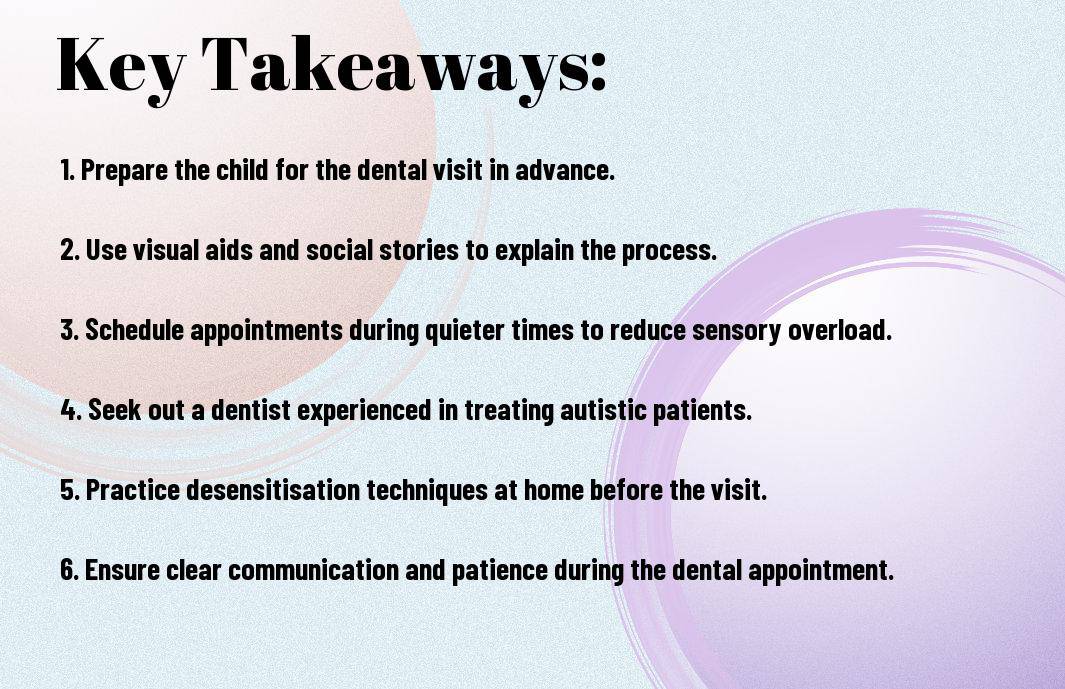Obtaining appropriate dental care for individuals with autism can be a challenging task for both families and dental professionals. The sensory, communication, and behavioural differences associated with autism can make routine dental visits a stressful experience. However, by understanding and addressing these unique needs, it is possible to facilitate comfortable and successful dental visits for individuals with autism. In this blog post, we will provide valuable insights and practical tips to make dental care more manageable for individuals with autism, as well as offer guidance for dental professionals to provide effective care in this context. For further in-depth information, you can also refer to the Practical Oral Care for People With Autism guide.
Key Takeaways:
- Preparation: Introduce the idea of dental visits early and create a visual schedule to prepare the individual with autism.
- Sensory Considerations: Address sensory sensitivities by communicating with the dental team about individual needs and providing sensory support during the appointment.
- Communication and Collaboration: Foster open communication and collaboration between the individual with autism, their carers, and the dental team to create a positive dental experience.

Challenges in Dental Care for Individuals with Autism
Individuals with autism often face numerous challenges when it comes to dental care. These challenges can stem from sensory sensitivities, communication barriers, and behavioural management needs.
Sensory Sensitivities
One of the most significant challenges individuals with autism face in dental care is sensory sensitivities. For many, the sounds, smells, and sensations associated with dental visits can be overwhelming. The bright lights, loud equipment, and strange textures can cause distress and make it difficult for individuals to sit still and cooperate during their appointments.
Communication Barriers
Communication barriers also pose a significant challenge for individuals with autism during dental visits. Difficulty in understanding and expressing their needs can lead to misunderstandings and anxiety. This can make it hard for dental professionals to provide the necessary care and for individuals to feel comfortable and safe.
It’s essential for dental professionals to be aware of these challenges and adapt their approaches to meet the needs of individuals with autism, creating a more positive and supportive environment for dental care.
Behavioral Management Needs
Behavioural management needs can also be a significant challenge for individuals with autism during dental visits. Some individuals may struggle with anxiety, sensory overload, and difficulties in understanding and following instructions, leading to challenging behaviours that can impact their dental care experience.
Understanding and addressing these behavioural management needs is crucial for creating a safe and comfortable environment for individuals with autism during dental visits. Implementing strategies to manage anxiety and sensory sensitivities can make a significant difference in their overall experience and dental care outcomes.
Preparing for the Dental Visit
When it comes to ensuring a positive dental experience for your autistic child, preparation is key. One helpful resource is a blog post titled How to Make Dental Visits Easier for Your Autistic Child, which provides valuable tips and insights for parents.
Selecting the Right Dentist
Choosing the right dentist for your child is vital. Look for a practitioner who has experience working with autistic children and understands their unique needs. It’s also important to find a dentist who is patient, gentle, and willing to take the time to build a rapport with your child.
Additionally, consider scheduling a meet-and-greet with the dentist before the actual appointment. This can give your child the chance to familiarise themselves with the dental environment and the dental team, which can help alleviate anxiety and fear.
Pre-Appointment Strategies
Prior to the dental visit, there are several strategies that can help prepare your child for the experience. Social stories, visual schedules, and role-playing can help your child understand what to expect during the appointment. It’s also beneficial to communicate with the dental team about your child’s needs and any specific triggers or sensitivities they may have.
Moreover, using calming techniques such as deep breathing, sensory tools, or listening to familiar music can help your child feel more relaxed and at ease before the appointment.
Furthermore, bringing along comforting items from home, such as a favourite toy or blanket, can provide a sense of security and familiarity during the dental visit.
Desensitisation Techniques
Desensitisation techniques involve gradually exposing your child to the dental environment and procedures in a controlled, supportive manner. This can include visiting the dental office for short, positive experiences, such as getting to know the staff, exploring the waiting area, or sitting in the dental chair without any treatment.
By gradually introducing these experiences, children can become more accustomed to the sights, sounds, and sensations associated with dental visits, reducing the likelihood of anxiety and fear.
It’s important to approach desensitisation at a pace that is comfortable for your child and to celebrate their progress along the way.
Accommodations and Adaptations in the Dental Office
When it comes to visiting the dentist, individuals with autism may face unique challenges that can make the experience stressful and overwhelming. To create a more comfortable and accommodating environment, dental offices can implement various adjustments and adaptations to better support individuals with autism.
Adjustments for Sensory Challenges
Individuals with autism often have sensory sensitivities that can be triggered by the sights, sounds, and sensations commonly associated with the dental office. To address this, dental staff can make simple adjustments such as providing sunglasses to reduce bright lights, using noise-canceling headphones to minimize loud drilling noises, and offering weighted blankets or vests to provide calming pressure during treatment.
Effective Communication Approaches
Communication can be a significant barrier for individuals with autism, particularly in a dental setting where clear and effective communication is essential for a successful visit. Dental professionals can use visual aids such as picture schedules or social stories to prepare individuals for their visit. Additionally, using clear, simple language and offering frequent breaks during appointments can help individuals with autism feel more at ease and engaged during their dental care.
It is important for dental staff to be patient and understanding, and to be aware of non-verbal communication cues that may indicate distress or discomfort.
Tailored Behavioral Interventions
Behavioural interventions tailored to the individual needs of patients with autism can significantly improve their dental experience. These may include techniques such as desensitisation to dental equipment, using positive reinforcement strategies, or implementing calming sensory tools in the dental office. By understanding the specific needs and triggers of each individual, dental professionals can create a more positive and calming environment for individuals with autism.
Implementing these adaptations and interventions can reduce anxiety and improve the overall experience for individuals with autism, making dental visits easier and more manageable for both the patient and the dental team.

Parental and Caregiver Support
Support from parents and caregivers is crucial in ensuring that children with autism receive the dental care they need. One helpful resource for parents and caregivers is the Dental Tool Kit provided by Autism Speaks. This tool kit includes helpful information and strategies for preparing children with autism for dental visits, as well as tips for finding an understanding dentist.
Role in Dental Care
Parents and caregivers play a vital role in ensuring that children with autism receive proper dental care. This may involve finding a dentist who is knowledgeable and understanding of the needs of children with autism, as well as preparing the child for dental visits and providing support during appointments.
Home Dental Hygiene Tips
It is important for parents and caregivers to help children with autism establish a regular dental hygiene routine at home. This may include using sensory-friendly toothbrushes and toothpaste, creating a visual schedule for brushing and flossing, and providing positive reinforcement for good dental hygiene habits.
- Consistency is key in establishing a dental routine
- Use rewards or a visual chart to track progress
- Thou should also consider consulting with an occupational therapist for sensory-friendly dental tools
Children with autism may require additional support and patience when it comes to dental hygiene. It is important to take their individual sensory sensitivities and communication challenges into account when assisting with dental care.
- Consistency is key in establishing a dental routine
- Use rewards or a visual chart to track progress
- Thou should also consider consulting with an occupational therapist for sensory-friendly dental tools
Building a Dental Care Team
Building a strong dental care team is essential for children with autism. This may include collaboration between the dentist, parents, caregivers, and any other healthcare professionals involved in the child’s care. Communication and coordination between all members of the team are key in providing the best possible dental care for children with autism.
Parents and caregivers should take an active role in advocating for their child’s dental care needs. This may involve communicating with the dental care team, seeking out accommodations for the child, and ensuring that the child’s unique needs are understood and addressed during dental visits. It is essential to build a supportive and collaborative relationship with the dental care team to ensure the best possible outcomes for the child.

Conclusion: Autism and Dental Care – Making Visits to the Dentist Easier
In conclusion, it is important to recognise the unique challenges individuals with autism may face when it comes to dental care. By understanding their specific needs and implementing strategies to create a more sensory-friendly environment, dental visits can become a less daunting experience for these individuals. It is essential for dental professionals to undergo training in autism awareness and communication techniques, in order to provide the best possible care for their autistic patients. Additionally, parents and caregivers play a crucial role in preparing and supporting their loved ones with autism during dental visits. With the right approach and support, we can work towards making dental care more accessible and comfortable for individuals with autism.
FAQ
Q: What is autism?
A: Autism, or autism spectrum disorder (ASD), refers to a range of conditions characterised by challenges with social skills, repetitive behaviours, speech and nonverbal communication, as well as by unique strengths and differences.
Q: Why is dental care challenging for individuals with autism?
A: Many individuals with autism have sensory sensitivities, communication difficulties, and anxiety, which can make dental visits challenging.
Q: How can I prepare my child with autism for a dental visit?
A: Preparation is key. Use social stories, visual schedules, and practice dental care activities at home to help your child become familiar with the dental visit environment and procedures.
Q: What can dental professionals do to support individuals with autism?
A: Dental professionals can undergo training in autism awareness and communication techniques, provide sensory adjustments in the dental office, and offer patience and flexibility during the visit.
Q: Are there any special considerations for dental treatment of individuals with autism?
A: Individuals with autism may benefit from accommodation such as shorter appointments, use of desensitisation techniques, and the presence of a trusted caregiver during the visit.
Q: How can I help my child with autism maintain good oral hygiene at home?
A: Use strategies such as visual supports, reward systems, and finding sensory-friendly oral care products to establish a regular oral hygiene routine at home.
Q: Where can I find support and resources for dental care for individuals with autism?
A: Look for autism-friendly dental practices, seek advice from autism support organisations, and connect with other parents of children with autism to share experiences and tips for dental care.







